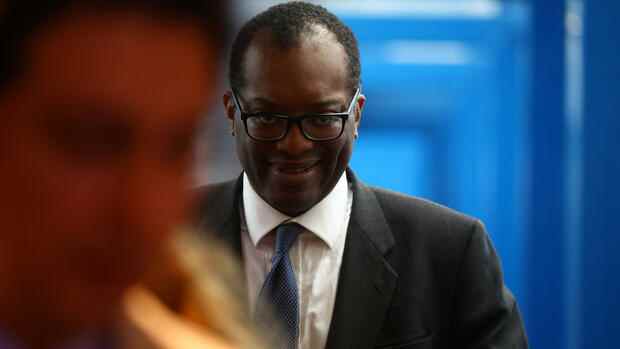At the end of October, the finance minister intends to announce new plans to relieve households and companies.
(Photo: Reuters)
London The Bank of England’s (BoE) decision to limit its bond-buying program to this week is fueling resentment and further uncertainty. In addition, the pension funds for which the emergency program was set up are getting more and more into difficulties.
Should there be renewed turbulence on the British markets after the end of bond purchases on Friday, the British central bank will be responsible, said Great Britain’s Finance Minister Kwasi Kwarteng on Sky News. Disruptions after the BoE’s withdrawal of support are “governor’s business,” he said on the fringes of the International Monetary Fund’s annual meeting in Washington.
The BoE started buying bonds at the end of September to support the British financial markets. The reason for this was a sell-off in pension funds.
Federal Reserve Chairman Andrew Bailey has now given the funds two more days to draw on the bank’s £65bn emergency facility. Then the program will be closed.
Top jobs of the day
Find the best jobs now and
be notified by email.
The tight deadline poses the risk of further market chaos, which could lead to the failure of some so-called liability-oriented investment strategies. It would pressure Kwarteng to come up with a revised package of tax and spending plans.
Rees-Moog questions budgetary authority’s competence
In late September, he and Prime Minister Liz Truss caused panic with their plans for massive debt-financed tax cuts. A short time later they withdrew part of the relief. According to economists, the measures could have cost the equivalent of up to 230 billion euros.
Unusually, the package was not accompanied by forecasts from the independent budgetary authority OBR. That was because the accuracy of OBR forecasts had not been particularly good in the past, Economy Secretary Jacob Rees-Mogg told ITV on Wednesday.
It is the job of finance ministers to make decisions – and not to assume that there is a single forecaster “who will hit the nail on the head”. Also, the OBR is not the only organization able to make forecasts.
At the end of October, Kwarteng wants to announce his new plans and also present an OBR forecast on the same day. Industry body Pensions and Lifetime Savings Association on Tuesday asked the Bank of England to extend its emergency bond purchase program until at least that date.
Pension funds are asking companies for emergency loans
In order to increase their liquidity, however, pension funds are looking for other investors: A number of British companies have reported that their pension funds have been asked to grant them emergency loans. News agencies learned this from consultants and pension fund advisors who wished not to be named.
The funds want to hedge against being forced to margin derivatives positions as gilts sell off again. To do this, they are looking at other ways in their portfolios to rebuild their liquidity buffers after exiting the most liquid assets.
To protect their customers, funds want to avoid parting with particularly valuable assets. This includes primarily their holdings of growth stocks or less liquid investments such as infrastructure projects, which should benefit the systems in the long term, it said.
A lawyer has said his clients’ requests for short-term emergency loans from employers could total hundreds of millions of pounds. “We have a number of large clients who have prepared emergency liquidity facilities to be provided by their sponsor,” said Patrick Bloomfield, a partner at consulting firm Hymans Robertson LLP, in a written response to questions.
More: There is an acute risk of crisis on the financial markets
